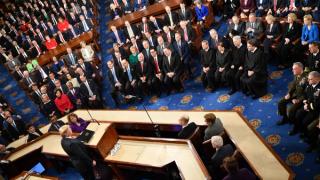When Donald Trump delivers his State of the Union address in a few days he will be only the second US President to do so under the shadow of an active impeachment trial in the Senate.
So how will Trump's address compare to that of Bill Clinton who delivered his State of the Union in similar circumstances in 1999?
In a frantic week which will include the Superbowl, the Iowa caucuses and likely Kobe Bryant's funeral, the State of the Union delivers President Trump an opportunity to take all eyes off impeachment.
The yearly update is mandated by the constitution and could be delivered in writing. But advancements in broadcast technology over the past century have seen the address rise to the status of genuine spectacle that draws 40 million or more television viewers — an irresistible draw for a ratings-obsessed President Trump.
The address provides an opportunity to drag the Senator-jurors from the Senate Chambers at the northern end of the Capitol Building to the southern House of Representatives.
As a political event, it's the only annual occasion offering a sitting President a forum to act in a range of his leadership roles at one time: head of state, chief executive, chief diplomat, commander-in-chief and chief legislator.
As well, the address provides an opportunity to drag the Senator-jurors from the Senate Chambers at the northern end of the Capitol Building to the southern House of Representatives.
How did Bill Clinton play it?
The 1999 State of the Union offered Bill Clinton a life raft as well.
Clinton took to the lectern on January 19, 12 days into his formal Senate impeachment trial and just hours after the opening of his legal team's defence.
Of the 7,514 words he spoke that night, delivered over one hour and 18 minutes, not one of them was "impeachment".
The closest Clinton came to acknowledging the existence of the impeachment trial was to caution against getting lost in "the daily press of events, in the clash of controversy".
This short mention paled in comparison with the two paragraphs he dedicated to the need to "solve" the Y2K problem and the overwhelming majority of the speech he spent detailing his administration's achievements.
Clinton's message implied a forced return to normalcy.
It was a traditional State of the Union designed to steer a path through a most untraditional presidential scandal.
It was a traditional State of the Union designed to steer a path through a most untraditional presidential scandal.
This approach matched the Clinton team's broader strategy to counter the "daily press" of impeachment events by having the president appear above them: too preoccupied with his job to even engage.
But unlike Trump, Clinton wasn't fighting for re-election.
Is Team Trump taking lessons from the Clinton camp?
In recent weeks President Trump has been astutely collecting "wins" to brandish during the State of the Union as well as an election campaign: a Middle East peace plan, a phase one trade deal with China, a US-Mexico-Canada trade deal, chest-thumping at Iran and the assassination of its highest-ranking general, a Supreme Court ruling in his administration's favour on tough immigration reforms and the steady trickle of news about the strength of the economy, despite some lower than expected indicators.
These are all likely to feature extensively in his address and he will claim personal responsibility for all of them.
But any suggestion the President is has been too busy to tune in to impeachment cannot be taken seriously.
President Trump's Twitter feed has been filled with play-by-play commentary, ridicule, fury, threats and disparagement.
In fact, on the opening day of the Senate trial and despite being an ocean away from Washington in Davos, Trump amassed 142 tweets and retweets in a day, a record for his time in office.
Any suggestion the President is has been too busy to tune in to impeachment cannot be taken seriously.
Team Trump has been keen to emphasise the president's achievements during official engagements and amplify these and other distractions from the proceedings.
But the president uses his private time to vehemently fight back against his critics.
It's hard not to see this filtering into his address.
So, Clinton's 1999 State of the Union contains few clues, but what about Trump's own addresses?
What do Trump's past SotU's tell us?
His first in 2018 was hailed as a milestone in his presidency, where he embraced the office, read from a teleprompter rather than off the cuff and issued a call for unity.
This didn't last much longer than the broadcast, but it was a clear attempt to be presidential'
His second in 2019 offers more guidance.
The Mueller investigation was in full swing and a protracted and politically damaging government shutdown over funding for a border wall meant the address was only the second State of the Union to ever be delayed.
Additionally, it was President Trump's first address to a joint sitting of the new Congress after the "blue wave" at the 2018 midterms flipped control of the House in favour of the Democrats.
With these legislative and investigative hurdles in place, there remained calls for unity in 2019, but they were couched in attacks.
President Trump decried the evils of socialism (read: Medicare for all, Bernie Sanders and AOC) and issued a veiled threat to his detractors: "If there is going to be peace and legislation, there cannot be war and investigation. It just doesn't work that way".
This was Nixon's infamous 1974 State of the Union declaration that "one year of Watergate is enough" with an added or else.
President Trump will not miss the opportunity to hit hard on his message of endless winning in the face of the "most unfair WITCH HUNT" in American history.
In 2020, with the House still controlled by Democrats, impeachment revelations in hyperdrive and an election campaign already in full swing, President Trump will not miss the opportunity to hit hard on his message of endless winning in the face of the "most unfair WITCH HUNT" in American history.
The Iowa Caucuses the night before will inform the angle of the Trump team's political language.
Expect another broadside aimed at socialism if Sanders or Warren steal the night, or an emphasis on fighting corruption if Joe Biden pulls through.
Or expect them both, whatever the case.
Everything is re-election in Trump's eyes and there are enemies everywhere.
The State of the Union may still pay homage to the need for unity, but it will be another skirmish in his endless fight for re-election.
There's only one thing we can be sure of: Trump's 2020 State of the Union is unlikely to resemble Clinton's 1999 version, despite impeachment overshadowing both men.






